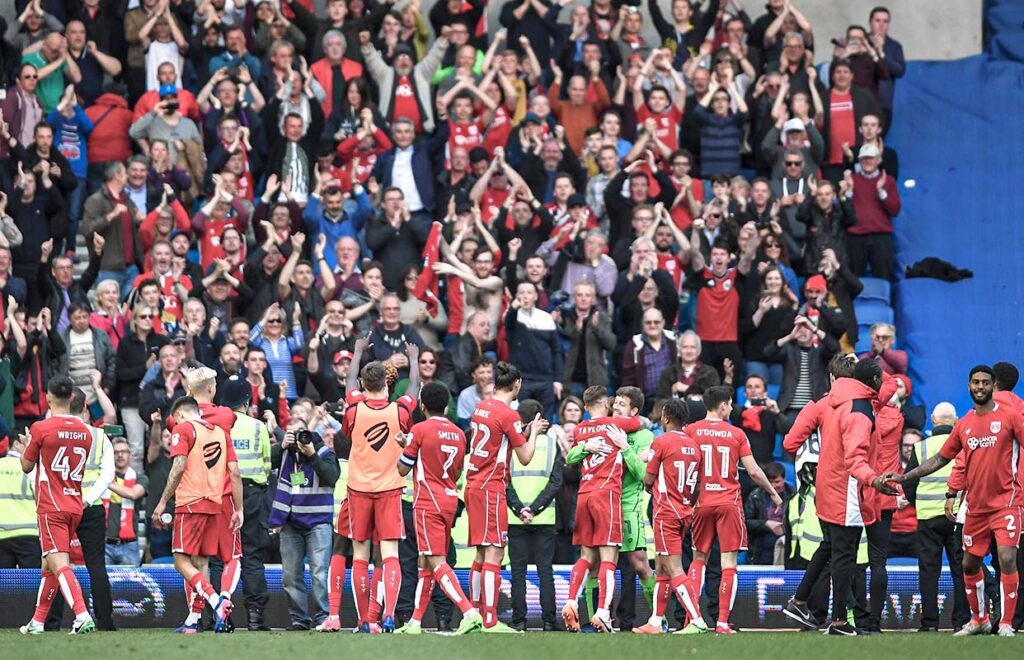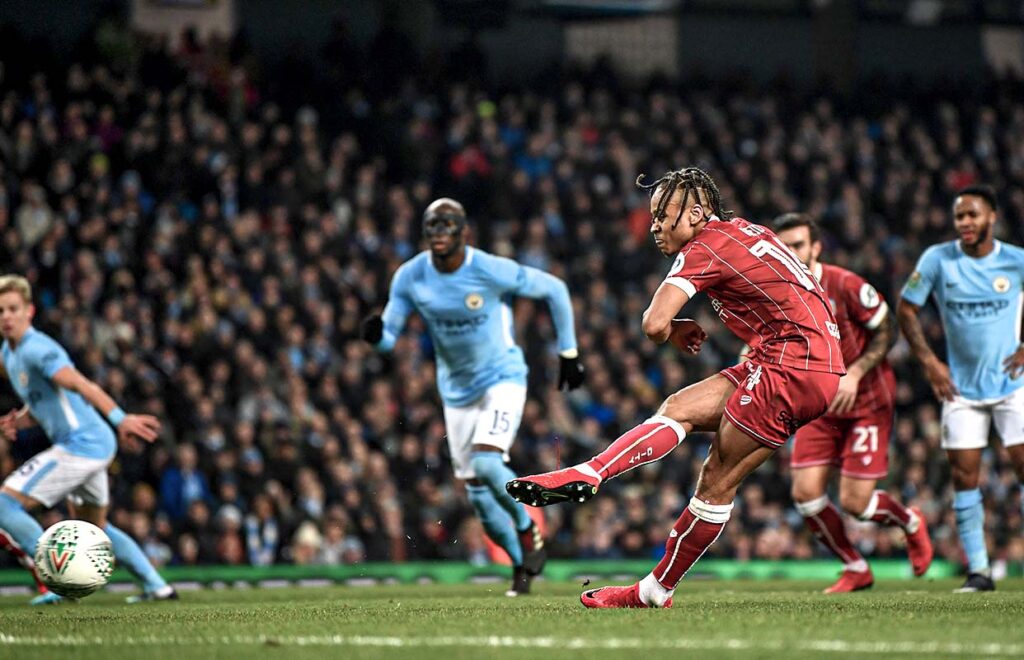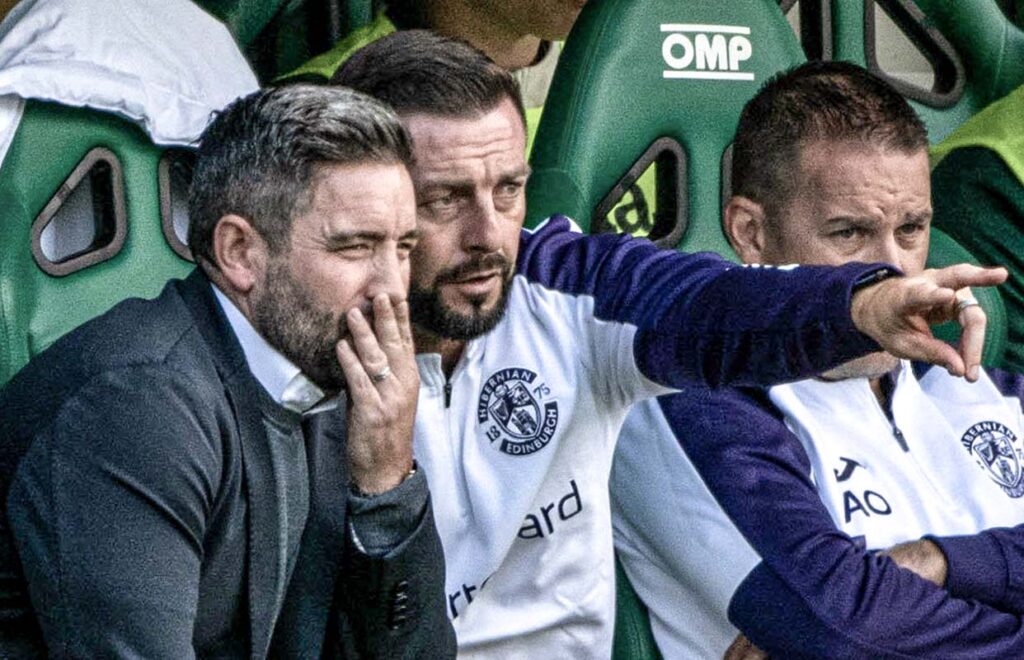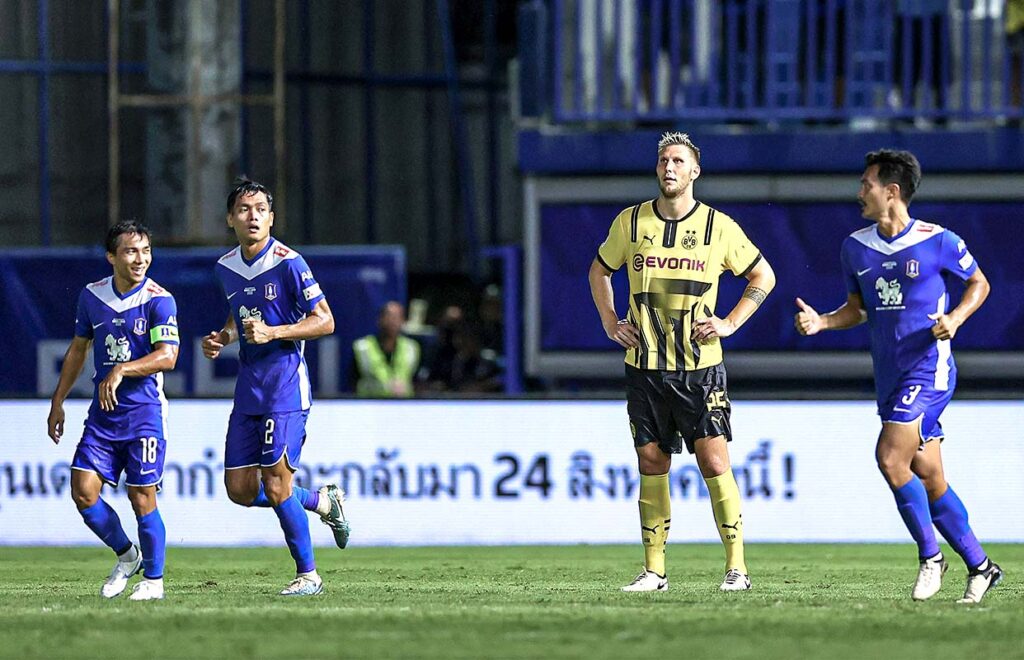Jamie McAllister
DPMM, 2024-
My passion for coaching began when I was a player.
I had started doing my badges when I was 32, running my own after-school clubs in the afternoons and helping out at the Bristol City academy in the evenings. At that time I had all these new passing and possession drills for seven and eight-year-olds, but they just wanted to run about, play and score goals. I learned quickly that, for children, it was about little, fun games.
But professional players want enjoyment, too. Football is something they play because they love it. That is why I design my sessions so that the players enjoy them as well as getting the benefit of information to make them better in all four corners – technically, tactically, physically and psychologically. The players have to learn from my sessions, but they also have a bit of freedom in them that helps with enjoyment.

Although I had been a player for many years, there was so much work I needed to do to develop as a coach. It takes time to understand the planning and details that go into organising sessions – to deliver information to the players as clearly as possible, so they all understand their roles and responsibilities, in and out of possession. Even putting on a simple session with a 5v5 or a 7v7, you have to understand what you are trying to get out of it, which will impact the set-up. With periodisation and methodology, you can’t just say: “We’re going to do 11v11 all the time.” You’ve got to get the balance right so the players get a hit of everything during the week, so they peak on a match day.
I love how much detail and science there is behind coaching and management. Players may not necessarily understand all that goes into it, but it probably helped me in the last five or six years of my playing career, to understand the game more and become a better footballer.
I wanted to keep playing as long as I could, but the next step after playing was always going to be coaching. At the end of the 2015/16 season, after 20 years as a player, I was 38 and had a decision to make. I had wanted to play until I was 40, because I was fit and hadn’t had many bad injuries. So I discussed it with my wife, who said that my future lay with coaching and that I should take the opportunity Bristol City were offering to become a full-time coach.
“We spoiled their party with a 1-0 win to secure survival”
At that time I had been playing for Exeter City – my ninth club in a career that included spells with Aberdeen, Hearts and Bristol City, as well as a cup win with Livingston and a Scotland cap. Before I signed for Exeter, I’d had my first taste of first-team coaching as a player-coach for Kerala Blasters in the Indian Super League. I was assistant to David James and we got to the 2014 ISL final. When the season finished, Paul Tisdale called and asked if I’d go to Exeter.
After 18 months as a player under Paul – who’s now head of football operations at Celtic – he asked if I could coach the 18s. Around this time, I also had the chance to interview for the role of Bristol City Under-18s coach. Two days later, Bristol City said: “You’ve been successful with getting the 18s role, but our Under-23s coach is now leaving, if you want to put your name in for that?”
So I met with Bristol City’s CEO, Mark Ashton, and the first-team head coach, Lee Johnson, and managed to get the Under-23s role. The following March, first-team assistant John Pemberton was sacked. There were 10 games left of the Championship season and the club was in the relegation zone. I was promoted to joint-assistant manager, along with Dean Holden, for the remainder of the campaign.

In the second-to-last game we went to Brighton, who needed three points to clinch the title, live on Sky. We spoiled their party with a 1-0 win to secure survival. Since my promotion we’d won six and drawn one of nine games to stay up. That summer I was offered the role of assistant manager on a permanent basis.
That meant supporting Lee in taking training sessions, doing video analysis, one-to-ones, IDPs, unit work and team work. Lee, Dean and I worked together, sharing responsibilities in training sessions. Lee was very good with us, so it was a really good experience, as well as being a successful period.
In my time there as a coach, we had a lot of good young players in the academy that we pushed and got into the first team. We challenged for the Championship’s top six a few times, got to the semi finals of the EFL Cup, and sold about £96m worth of talent, which wasn’t bad going.
“Mourinho came into the office for a chat, congratulated us and wished us good luck”
We had a great group of players and staff, and it all aligned in that cup run. To get to the quarter finals we had to beat Marco Silva’s Watford, Mark Hughes’ Stoke and Roy Hodgson’s Crystal Palace – all Premier League clubs at the time. It didn’t get any easier, because in the last eight we had to play the holders, Manchester United, who were managed by José Mourinho.
They had some top players, including Zlatan Ibrahimovic, Marcus Rashford and Paul Pogba. Ibrahimovic scored the equaliser against us, but we went on to win 2-1. After the game Mourinho came into the office for a chat, congratulated us and wished us good luck.
In the semi finals we faced Pep Guardiola’s Manchester City over two legs. It was the season they won the Premier League with a record 100 points, so the challenge we faced was huge. I went to watch them play against Watford at the Etihad. Seeing how they played with such a high line, I thought we could expose it.

The first leg was away and we wanted to be very front-footed, with pressing triggers to try to win the ball back. In the 44th minute Bobby Reid nicked the ball off their centre-half, got through and was awarded a penalty, which he converted. Then we had another great opportunity from exploiting their high line, which unfortunately we didn’t take. But to see what we had worked on in training come off against a team of that calibre was rewarding.
It gives you a buzz to see players implement what you’ve worked on, but also improving them daily and seeing them go on to further their careers. It is very rewarding to see players you’ve coached move up to the Premier League and represent their country.
A coach can only do so much, though. Ultimately it is up to the players, and a team is only as good as the players. As a coach you can improve them, but it is the players who cross the white line and must implement what you have worked on.
“What he has done in the last 20 years is incredible”
Against the top teams you need plenty of tactical knowledge and understanding to try to find an edge, or a marginal gain to beat them. Against City, we ran them close. It took an injury-time winner from Sergio Agüero to beat us 2-1 at the Etihad, and a last-minute goal from Kevin De Bruyne to beat us 3-2 at Ashton Gate.
After the first game, Pep Guardiola was in his office with his coaching staff. We popped in and he ended up giving us 25 minutes of his time, talking football over the beers that he had handed us. He was complimentary about how we had played, and said: “Not a lot of Premier League teams come here and play the way you played against us.” He was very humble.
I loved my time at Bristol City. I had been there six years as a player, then four and a half years as a coach. It’s a great club, underpinned by the owner, Steve Lansdown. What he has done in the last 20 years is incredible, and he continues to put his money in and improve it every year.

Myself and Lee had played together at Bristol City for a few years, before we came back together as coaches. We’d always been good friends and he liked my views on football, so when I got the opportunity to go back in and work with him, it was too good to turn down. We were successful every time we worked together, first at Bristol City, then Sunderland – where we won a cup and got into the playoffs – then at Hibs, where we got them into Europe.
After we left Hibs in 2023, Lee wanted to get straight back in and took the Fleetwood job three weeks later. I wanted to try something different, and towards the end of that year Matt Taylor got the Bristol Rovers job. He asked if I’d be interested in going in with him.
I was thinking: “I’m not sure I can do that. I’ve been at Bristol City for 10 and a half years and I’ve got a lot of friends there. If I go to the other side, I’ll be in big trouble!” It turned out to be a tough time going in there, just after Joey Barton had been sacked. A lot of his players were there and Matt wanted to change a lot. As it turned out, at the end of the 2023/24 season, I decided the time had come for me to go and be my own man.
“In Brunei, education and faith comes before football, which is no bad thing”
I’d had opportunities in the past to be a manager, but now I knew I was ready. That summer, I had some interesting opportunities to get the ball rolling with my managerial career, working in Asia. I had loved my time in India, so I was open to another new experience.
DPMM, who play in the Singapore Premier League and are the biggest football club in Brunei, were really keen to get me in. It’s always nice to be wanted and it was an exciting opportunity, so I have been here for just under a year now.
To give some context, the population of Brunei is only around 460,000 people, which is smaller than Glasgow. And unlike for so many people in Scotland and England, football is not the main priority here. In Brunei, education and faith comes before football, which is no bad thing. In fact, there is a lot that people in the UK could take from the mentality they have here.

For instance, back home in the UK, if your kid’s not well, you need permission before you can take the time off to care for them. Here, they just say: “My kid’s not well so I’m not coming in.” Because health and family are most important to them. That has opened my eyes a little bit. Yes, you want to do everything you can to win, giving everything every day. But when it comes down to it, your health and family are number one.
Since arriving here, I have worked on bringing more professionalism to some areas of what we do. For example, I have been educating players on diet and sleep. They are good, honest lads who want to work hard, give you everything and keep learning, which is all you can ask for.
I have also learned the importance of patience. In the first two months I wanted everything done immediately, but I have since realised that they take a little bit longer to do things here. And that the players need information delivered to them little and often. Too much and it can scare them, so I keep it simple. Then it is about giving them confidence and belief.
“I want to bring through young players and create more of a pathway”
I’ve got two Brunei assistants, Bobby and Moksen, who were players at the club and are really supportive. The goalkeeping coach, Jorge, is Brazilian and has been here six years, so he knows Brunei inside out. He has passed on his experience of how to get the best of the Brunei players, because he knows what the mentality and character is like. The general manager, Ali, is my go-to, and the Crown Prince is above that.
This season we have qualified for a Singapore Cup semi final, which is a huge achievement. If you look at the last four, it’s the top two in the Singapore Premier League, plus Pathum United – one of the top teams in Thailand – and us, so we’ve done really well.

I want to bring through young players and create more of a pathway, because there are not enough young players coming through. We are trying to implement an Under-18s league, and an academy system within DPMM to find the best young players in the country. The idea is to improve DPMM and the national team in the next three to five years.
In this first year I have also served as an interim head coach of Brunei’s national team, in four games. We reached the third round of AFC Asian Cup qualifying for the first time in the country’s history, which was an incredible experience for me and a privilege as a young coach. There is a lot to improve here and I want to be part of it, using my experience to help the federation, national team and DPMM to improve Brunei’s football infrastructure.
“Being away from my family on the other side of the world is difficult”
To grow the game and get young people excited about playing, I have done coaching sessions in schools. I have also been helping coaches in Brunei. Currently we have three A Licence coaches in the whole country, which is nowhere near enough. It will take time to improve, but the people I have spoken to at the federation are keen to do it. Hopefully I can help, putting on seminars for coaches, for them to ask questions and learn from me, as well as me learning from them.
The same goes for my players, who I want to make better and want to make me better. I want them to ask questions, to challenge and improve me, because I don’t know everything. I’m still learning as well, so I am open to input that could benefit them, the group and me.

For me, it is so important to be hardworking, honest and empathetic. When I was a player I always wanted honesty on what I needed to improve. Some things can be hard to hear, but I will be honest – while showing empathy – if it will help make someone better. I am the same with my own children.
Being away from my family on the other side of the world is difficult, because I love and miss them. But I am doing it for them, to provide them with a better life and financial stability. It has also been a chance for them to come out here and experience a different lifestyle.
For me, it is an opportunity to improve as a coach, working with players of different nationalities, with different languages on a different continent. My passion is with DPMM and football in Brunei, so I am excited about this project and looking forward to how things develop.

Jamie McAllister


